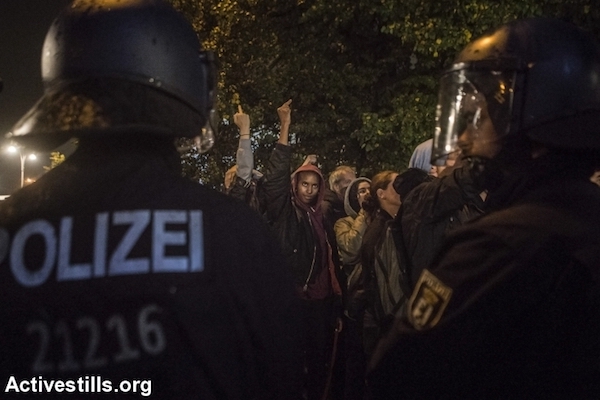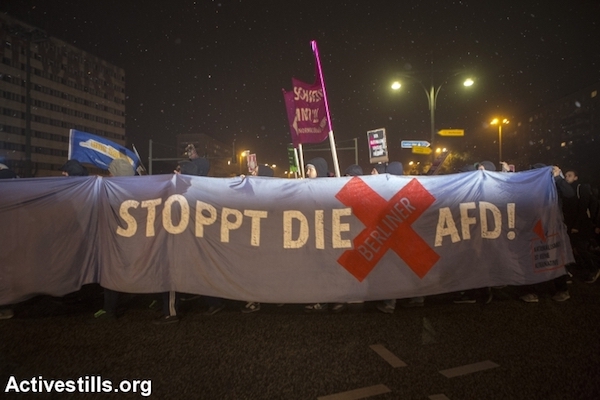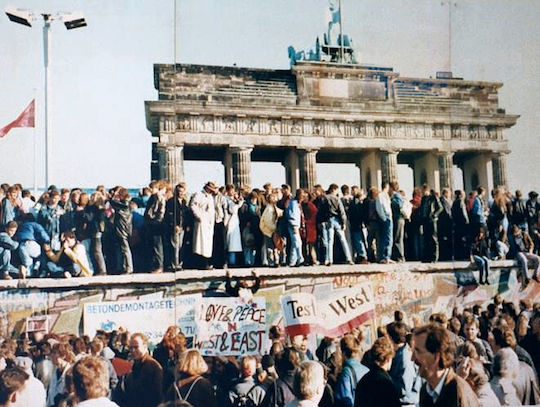During the first awakening of Germany’s nationalist ghosts after reunification, the country never really had an honest conversation about racism and violence in East Germany. The rise of the AfD and its strong support in the East demonstrates that the country must still be vigilant about protecting its democracy and institutions.
By Şeyda Emek

I was in high school on the morning of May 29, 1993, when neo-Nazis burned down a house in Solingen, Germany, inhabited by families of Turkish origin. Five people, two young women and three girls, died in the flames. Seventeen others were severely injured.
As school began that morning, my history teacher broke down in sobs facing the class. He had been a boy during World War II. When he woke up to the news that people had again been burned to death because of their ethnicity in Germany he couldn’t stop crying.
It was the second deadly arson attack in six months. Two girls and their grandmother had been murdered when Turkish families’ homes were burnt down in Mölln on November 23, 1992. Nine other family members were severely wounded.
The Mölln and Solingen incidents were the culmination of a series of racist attacks that began shortly after German unification in 1990, as were the Hoyerswerda and Rostock-Lichtenhagen attacks. In Hoyerswerda in Saxony, a mob of 500 people attacked Vietnamese street vendors, stoned and petrol bombed an asylum shelter for a full week in September 1991. And in Rostock, several hundred people attacked an asylum shelter with stones and petrol bombs for two days in August 1992 while 3,000 bystanders applauded.
The 1990s in Germany, when I was a teenager, were not only about the fall of the Berlin wall and happy citizens peacefully reuniting on the streets, amidst calls of: “We are the people!” They were also the years when nationalism returned to Germany. I remember my parents’ fears for us children, their worried whispers with Turkish neighbors and friends.
I thought often of this period during last Sunday’s German elections, when 5.8 million people voted for Alternative for Germany (AfD). Founded in 2013, the extreme right, anti-immigrant party entered parliament with 12.6% percent of the vote, winning 94 of the 709 seats. For the first time since Hitler’s NSDAP, a party whose leadership openly praises Germany’s military’s conduct during the two World Wars, as chairperson Alexander Gauland has done, will enter the Reichstag.

AfD promotes anti-Muslim policies and emphasizes Germanness as a superior culture. Its ideology is based on the idea that Germanness can only be acquired biologically. On the campaign trail, Alexander Gauland said that State Minister Aydan Özoğuz, of Turkish descent, should be “disposed in Anatolia.” Several ranking members of AfD openly deny the Holocaust and German responsibility for it. Frauke Petry, another chairperson, opined that German borders should be protected by firing on asylum seekers. She left AfD the day after the elections due to internal power struggles, though she will keep her parliamentarian seat.
Nationalism seems to be rising everywhere. France came close to having Marine Le Pen as president, Britons maneuvered themselves out of the EU with “Britain first” rhetoric, and U.S. president Trump used an America first rhetoric at the UN General Assembly just last week. Austria may see the strongest showing in years for the far-right Freedom party in its upcoming elections, while Poland and Hungary are already living with nationalist governments.
Some have tried to calm fears, observing that the political impact of the AfD in Germany is limited, relative to those other European and American examples. Polls indicate that many voted for AfD as a protest against the established parties’ policies on immigration and homeland security rather than support for their overall far-right worldview; other politicians vowed to work on winning back the lost votes in the next elections. This is certainly important, and it is certainly good to avoid hysteria.
But it would be an illusion to think that AfD will vanish soon because it is “just” a protest party. Neither of the other protest parties in recent German history, the Greens or DieLinke, vanished once they had entered parliament – instead they became constant fixtures in German political life.
Downplaying the meaning of AfD’s electoral showing also neglects the fears of Germany’s immigrant, Jewish and other minority communities. In Germany, nationalism and pride in the past more often than not goes hand-in-hand with a glorification of Nazi Germany, Holocaust denial and ideas of biological Germanness rather than a social-citizenship based shared German identity.

During that first awakening of Germany’s nationalist ghosts after the reunification, we never really had an honest conversation about Rostock, Hoyerswerda, Mölln or Solingen, nor about racism specifically in East Germany. When a right-wing terrorist cell in Saxony was identified in 2011 as responsible for the murder of nine people of foreign background and a female police officer, and numerous other crimes over the course of a decade, Parliamentary commissions of inquiry concluded that institutions were either unable or unwilling to cope with the widespread Neo-Nazi trends, particularly in the eastern states such as Saxony and Thüringen.
Indeed, comparing regional results for AfD shows a large gap between the west and the east: its highest score in the west was 12.4 percent in Bavaria, where the the head of Angela Merkel’s conservative sister-party, CSU, vehemently opposed her refugee policy. By contrast, AfD won an average of 20 percent of votes in the east; in Saxony it got 27 percent of votes, and in some districts of Saxony, AfD won 40 percent. Berlin is another example of the west/east divide where AfD won 10.7 percent and 20.5 percent, respectively.
It is often said that high unemployment and deserted former industrial areas in the east explain right-wing voting. But deserted coalmines, shuttered factories or agricultural farms, with the accompanying high unemployment exist in western regions as well, especially in the former mining regions of North-Rhine Westphalia (NRW). And by far more people of foreign descent or refugees live in NRW than anywhere in the east. Western German states took in far more refugees than eastern states. Despite all this, AfD received much fewer votes in NRW than in the east: just 9.4 percent.
This stark contrast in political trends between west and east will lead to a much rougher political atmosphere. AfD is now involved in decision-making; further, some politicians of the established parties, such as the head of the CSU in Bavaria, have announced that they will embrace more right leaning politics so as not lose more votes in the upcoming regional elections next year. Others will likely follow.
Despite all this, it is important to recall that 87 percent of German voters did not vote for the AfD. If politicians now react with populist policies to accommodate AfD voters, the 13-percent minority will dominate the political climate; that means selling out the fundamental democratic values embraced by the majority.
What Germany needs now are politicians who stand up for equality and democratic values in our institutions and visible civic engagement on every level to show that we won’t allow the erosion of democracy in Germany. And we need to take the fears of minorities seriously. Because they are the ones directly targeted, verbally and most likely physically. Again.
Şeyda Emek is a former German administrative court judge and adviser to the German Government on constitutional law. She is currently a visiting scholar to Columbia University’s Freedom of Expression Initiative in New York and a fellow at the Bruno Kreisky Forum for International Dialogue in Vienna, Austria. She holds a doctorate in law from Ludwigs-Maximilian-University in Munich and studied law at Georg-August-University in Göttingen and Nottingham University, UK. The views expressed in this article are hers and hers alone.
